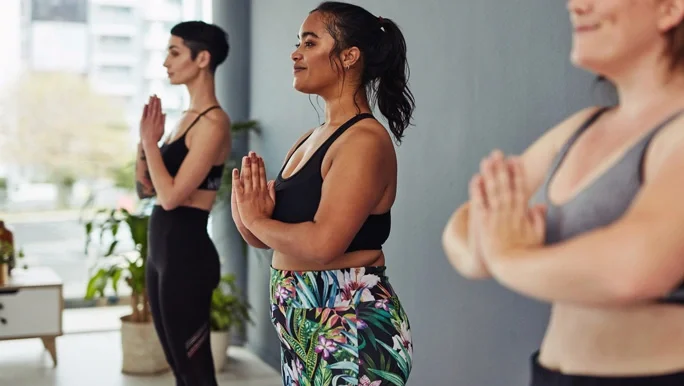How many different exercises or sports have you tried? Or how many apps to get started on your ‘fitness journey’ have you downloaded?
For me, it’s been a lot. I tried running, played netball and softball, got into all kinds of shapes in yoga and lay on a reformer in Pilates.
I downloaded apps with eight-week transformation challenges that guaranteed to get me in the best shape of my life which I stopped after the fourth week when the repetitive routines became boring. Over my lifetime, the only two sports I’ve stuck with have been swimming and CrossFit.
I’m sure most of us can relate to the never-ending cycle of wanting to start some exercise program but really not sure how to do it, let alone sustain it.
There are lots of reasons why people might struggle to get started with exercise but there are also ways to seamlessly integrate some movement into your routine.
1. Find an activity that you actually want to do
It’s easy to get swept up into doing something you think you should do or that is popular and claiming to be the ‘best’ exercise around at the moment. What is more important though is picking an activity that really tickles your fancy and you’re going to enjoy it.
The power of picking an exercise you love makes it much more likely that you will turn up because it doesn’t feel like such a chore.
2. Incorporate your exercise into existing habits
I have a number of things that I do on autopilot - having a shower and brushing my teeth for example. I don’t have to think about it and it makes doing these a lot easier by bypassing the need to flex your willpower muscles and protecting against any temptations (I’m looking at you Netflix!).
One way to incorporate this is to tack some of your exercise routines onto an existing habit. Put on your workout clothes in the bathroom so as soon as you brush your teeth, you’re dressed and ready to head out the door for example.

Get your friends or family to join you on your exercise journey.
3. Enlist family and friends for support
One thing that consistently comes up in helping people be active is the impact of people around you. Whether it be your friends or your partner, get everyone involved in your activities.
This could mean doing something with your partner, perhaps making an evening walk something that you do together. Or it could be as simple as asking them to be your cheerleaders.
Tell your friends about your exercise routine, how proud you are of yourself and how helpful their support will be for you.
4. Have kids? Do something fun with them!
For the parents, having kids makes your life incredibly busy and finding time for yourself can be tricky. Not only that, parents can report guilt when they prioritise their me-time which is very understandable.
The lowdown on 10,000 steps a day
Do you really need to do 10,000 steps a day or can you safely throw caution to the wind and forget about step counts altogether? Let's find out.
One way that you can help this is to involve your kids in your exercise routine - walking with your little ones in a pram, or involving them in your sports and activities as they get older makes it a family experience. You could even commit to starting with a family fitness challenge.
Who knows, your kids might even show you a new sport or activity that you can join them for!
5. Prioritise some time
This sounds like a bit of a cop out, I know. If it was just this easy, everyone would be exercising. For some people though, booking out some time when you are just not available like you would for a meeting or any other commitment, can be helpful to keep your exercise dates.
Now, of course, this might mean working around your schedule or even your family’s schedule, but why not make a certain time of the day your exercise time? My time is before work in the morning when I’m less likely to be disturbed and less likely to be tired at the end of the day.

Celebrating your progress means you're more likely to stay motivated.
6. Celebrate your wins
Feeling like you’re making some gains is a great way to keep motivation up when starting a new exercise routine. And I’m not talking about how your jeans fit.
Research has shown that when we celebrate getting better at something, it satisfies our basic psychological needs and leads us to be more likely to stay motivated.
This can mean giving yourself a pat on the back when you have a run three days in a week, or perhaps that you were able to lift more weight than you did last week. Maybe you can be proud of yourself for finally mastering a spin bowl in cricket or kicking some goals at footy.
Whatever it is, celebrate every little win you have. You definitely deserve it!
Dr Nikki Stamp is an Australian trained cardiothoracic surgeon and PhD candidate. She has a strong desire to change the way we think about health and is a passionate supporter of the Heart Foundation and women's heart disease advocacy. Nikki is a previous member of the healthylife Advisory Board.
read more from Dr Nikki Stamp
health services
health services

Health advice in 2022: what to keep and what to ignore
When it comes to tips on being healthy there's some really great advice available. Also some that's not. Find out what advice to follow and what to leave behind.
Women's health
Women's health

What women need to know about their hearts
Did you know that broken heart syndrome is real? Discover the facts and figures that are unique to women when it comes to heart health, and why right now is the best time to proactively look after it.
Reviewed by the healthy life Advisory Board January 2022






